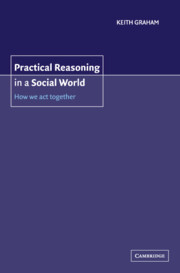Book contents
- Frontmatter
- Contents
- Preface
- Acknowledgements
- Introduction
- 1 Practical reasoning in context
- 2 The indistinctness of persons: causal interconnection
- 3 The indistinctness of persons: the personhood of collectivities
- 4 Practical collective identification and dissociation
- 5 Practical reasoning: sources and constraints
- 6 Practical reasoning and morality
- Conclusion
- Bibliography
- Index
2 - The indistinctness of persons: causal interconnection
Published online by Cambridge University Press: 22 September 2009
- Frontmatter
- Contents
- Preface
- Acknowledgements
- Introduction
- 1 Practical reasoning in context
- 2 The indistinctness of persons: causal interconnection
- 3 The indistinctness of persons: the personhood of collectivities
- 4 Practical collective identification and dissociation
- 5 Practical reasoning: sources and constraints
- 6 Practical reasoning and morality
- Conclusion
- Bibliography
- Index
Summary
We have noted already that we live in a culture which endows individual human beings with certain kinds of primacy or basicness. In accordance with that culture I begin in this chapter from a consideration of the individual human being, and I trace some of the consequences which follow once we surround that individual with other individual human beings. In chapter 1, section 4 the idea of distinctness as separateness (D2) was introduced. Any inferences from that idea must be consistent with the fact of causal interconnection, the truism that everything a person does carries causal implications for the lives of other human beings. My aim is to bring some precision to that truism and then consider what follows from it. I indicate the importance and the trickiness of the truism for Mill's discussion of self-regarding acts; argue for including causal precondition as well as causal consequence in the idea of interconnection; and suggest that both consequences and preconditions are relevant to practical reasoning and the moral assessment of actions. I then extend my argument from actions to preferences and suggest that interconnection carries implications for received views about the distinction between nosy and more acceptable preferences.
INDIVIDUALS AND CAUSAL CONSEQUENCE
Recall the intuitive idea referred to in chapter 1, section 4: that the best state of affairs is one in which as many distinct people as possible are carrying out their plans as successfully as possible and are hence achieving their good.
- Type
- Chapter
- Information
- Practical Reasoning in a Social WorldHow We Act Together, pp. 38 - 65Publisher: Cambridge University PressPrint publication year: 2002



